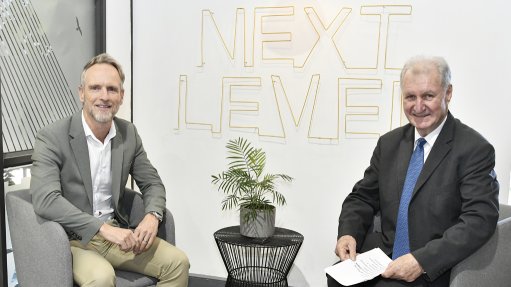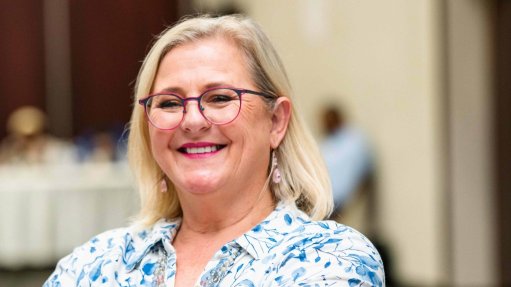Opportunities abound in transport, logistics if challenges can be addressed
There are considerable challenges facing the country’s commuter transport, freight and logistics sectors, which are impeding economic growth; however, there are signs of improvement.
This was a key message from speakers during a transport and logistics panel discussion, on day two of the Manufacturing Indaba on June 22.
Transnet Engineering CE Ralph Mills outlined some of the challenges, including a considerable backlog, substantial security challenges - especially in terms of locomotives being vandalised, the impacts of the pandemic and civil unrest, as well as macroeconomic factors such as the Russia-Ukraine conflict and supply chain disruptions.
He emphasised that the country should work to address these challenges but said it was important to balance expectations.
Mills pointed out that there was a global commodities boom, but that South Africa was unable to facilitate the transfer of resources to exit points. He noted that it took time and additional financing to ramp up operations, while the costs of establishing the infrastructure could not come from the operating profits of the rail network alone.
Therefore, he stressed that infrastructure and the operations of the rail network had to be seen as two different entities.
He added that there must be consideration of what the private sector could contribute towards infrastructure development, including the recent move towards third-party access to the network.
Meanwhile, Frost & Sullivan research director Craig Parker said transport corridors and the manufacturing sector must go hand in hand, with policies for these to be integrated.
Moreover, he said the relationship between the public sector and the private sector in these areas must be a good symbiotic relationship, to ensure the country can maintain sustainability of the logistics and supply chain network.
Parker averred that if the important factor of backing from government was provided, then there were many private logistics players that were keen and willing to participate.
In terms of transport corridors, he noted that these were important within the country and said considerable progress had been made in this area.
However, he emphasised that peripheral industries and the private sector needed to come into play as well, to enhance their contribution. He noted that the private sector’s role in providing infrastructure in this regard would be key, with opportunities to build on the already established infrastructure.
Motus Africa CEO Tim Jacques also said there were considerable challenges in the sector, with it being difficult and time-consuming to move goods around the country and within the continent.
However, he noted that efforts were being made to improve this, across different countries in the region, with the problems being understood and starting to be addressed.
For example, he noted rail projects being undertaken in Kenya, and efforts in East African countries to move cargo from road to rail.
Walvis Bay Corridor South Africa business development manager Irvaan Maharaj highlighted that the country had a relatively good core network on national economic infrastructure.
Therefore, he pointed out that the challenge was to maintain and expand this, as well as the electricity, water and transport communication networks to support economic growth and social development goals.
He also touched on the issue of the Port of Durban being affected by weather, which meant that more cargo had to be diverted through Namibia. Therefore, he pointed out that there are opportunities in cross-border transport and working together for operational solutions.
Mills also pointed out the need for a continental approach, with regional integration key to unlocking the transport sector. He said the demand on the continent for rolling stock was high, therefore, what should be pursued instead was a transfer of technology, and creating capacity and capabilities across countries.
That would allow for the continent to compete as one entity, rather than as individual countries, and move away from looking at short-term assistance from foreign countries outside of the continent, he noted.
Article Enquiry
Email Article
Save Article
Feedback
To advertise email advertising@creamermedia.co.za or click here
Comments
Press Office
Announcements
What's On
Subscribe to improve your user experience...
Option 1 (equivalent of R125 a month):
Receive a weekly copy of Creamer Media's Engineering News & Mining Weekly magazine
(print copy for those in South Africa and e-magazine for those outside of South Africa)
Receive daily email newsletters
Access to full search results
Access archive of magazine back copies
Access to Projects in Progress
Access to ONE Research Report of your choice in PDF format
Option 2 (equivalent of R375 a month):
All benefits from Option 1
PLUS
Access to Creamer Media's Research Channel Africa for ALL Research Reports, in PDF format, on various industrial and mining sectors
including Electricity; Water; Energy Transition; Hydrogen; Roads, Rail and Ports; Coal; Gold; Platinum; Battery Metals; etc.
Already a subscriber?
Forgotten your password?
Receive weekly copy of Creamer Media's Engineering News & Mining Weekly magazine (print copy for those in South Africa and e-magazine for those outside of South Africa)
➕
Recieve daily email newsletters
➕
Access to full search results
➕
Access archive of magazine back copies
➕
Access to Projects in Progress
➕
Access to ONE Research Report of your choice in PDF format
RESEARCH CHANNEL AFRICA
R4500 (equivalent of R375 a month)
SUBSCRIBEAll benefits from Option 1
➕
Access to Creamer Media's Research Channel Africa for ALL Research Reports on various industrial and mining sectors, in PDF format, including on:
Electricity
➕
Water
➕
Energy Transition
➕
Hydrogen
➕
Roads, Rail and Ports
➕
Coal
➕
Gold
➕
Platinum
➕
Battery Metals
➕
etc.
Receive all benefits from Option 1 or Option 2 delivered to numerous people at your company
➕
Multiple User names and Passwords for simultaneous log-ins
➕
Intranet integration access to all in your organisation


















